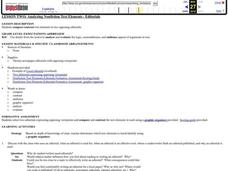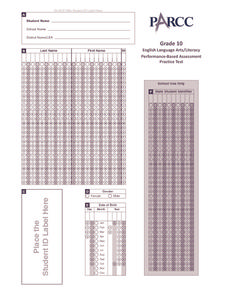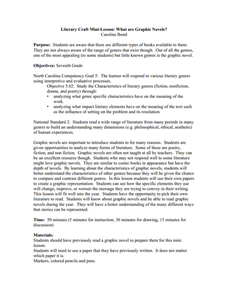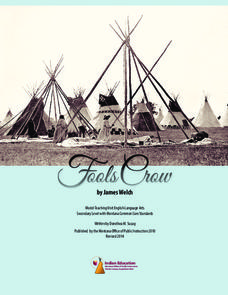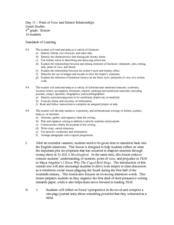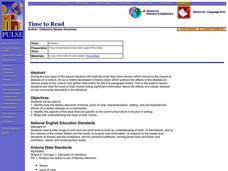Curated OER
Finding Excellent Nonfiction in Long-form Journalism
How to find engaging, rigorous nonfiction texts through long-form journalism.
Curated OER
Reading Study Guide: I Know Why the Caged Bird Sings
Meant for use with Maya Angelou's first autobiographical volume I Know Why the Caged Bird Sings, the materials here are designed for a homeschool setting, but they'd suit any classroom or text. Graphic organizers, chapter summary guides,...
Maryland Department of Education
The Concept of Diversity in World Literature Lesson 8: Nonfiction Close Reading
As part of their study of Things Fall Apart, class members conduct a close reading of a section of Chinua Achebe's essay, "An Image of Africa: Racism in Conrad's Heart of Darkness." Jigsaw groups then compare the voice in the essay...
Curated OER
Writing Prompts for High School
Here’s a great teacher resource - thirty-five writing prompts designed for high school writers. Categories include cause and effect, definition, expository/informative, persuasive, how to, descriptive, narrative, biographical narrative,...
Curated OER
Short and Sweet Science
Readers learn how to summarize scientific text and evaluate the advantages, disadvantages, and challenges in writing summaries. They select science-related articles you've pulled and collected from the New York Times and, with a partner,...
Curated OER
Analyzing Irony in Nonfiction
Students examine the use of irony in non-fiction works. In this literature lesson, students read non-fiction war texts and explore the use of irony in the piece as they respond to discussion questions.
Curated OER
Nonfiction Assignment Sheet
In this nonfiction genre worksheet, students read a nonfiction story and then complete a summary, vocabulary, interpretation, criticism, and a personal response.
Curated OER
Historical Agency in History Book Sets (HBS)
Study historical events by combining the study of historical fiction and non-fiction. Learners read about true past events in historical fiction novels and then research non-fiction accounts of the same events. What are some differences...
Curated OER
Writing Prompts for High School
Are you teaching a high school language arts class and stumped for writing topics? Five pages of writing prompts for all kinds of writing should help you out. Many of these prompts refer to texts that are not included in this resource,...
Curated OER
Analyzing Nonfiction Text Elements - Editorials
Students examine the text features of non-fiction. In this literacy lesson, students read editorial samples provided by their instructor and analyze the texts for word choice, details, and organization.
Curated OER
Performance-Based Assessment Practice Test (Grade 10 ELA/Literacy)
Get an idea of how your class members might perform on the Common Core tests with a comprehensive practice test. The assessment includes literary and informational passages for learners to read an analyze. Pupils respond to a series of...
Curated OER
Language Arts: Learning About the Self
Tenth graders explore the self through a study of autobiographies. By writing daily in their journals, they improve their writing skills and write reflection pieces at the end of the year. Through a series of writing assignments, 10th...
Curated OER
Exploring Prejudice and Text-to-Text Relationships
Tenth graders use the novel To Kill a Mockingbird to analyze relationships in society. In this literature analysis lesson, 10th graders participate in a shoe activity where they bring in one shoe belonging to someone they know and a...
Curated OER
Lesson Plan 3: Great Book, Gross Book
It's time for your scholars to become book reviewers! Start with a fun review of foods: are they good or gross? Learners apply these evaluation techniques to books, recording their thoughts on large pieces of butcher paper. Simply have...
Shmoop
ELA.CCSS.ELA-Literacy.W.9-10.9
Encourage your pupils to support their claims with textual evidence, whether is is from literary texts or informational texts. You might use the assignment example, which suggests an assignment on what it's like to be an immigrant in...
Appalachian State University
What Are Graphic Novels?
To do this engaging and pleasurable activity, your learners should have already read a graphic novel, and produced a piece of writing that can be reproduced into the format of a graphic novel. This exercise provides a script that...
Curated OER
James Welch's Fools Crow
Learners explore the history of Montana's Native Americans by reading James Welch's Fools Crow. Set shortly after the Civil War, the novel focuses on a young Blackfoot Indian and his tribe. Over the course of several weeks, class members...
Curated OER
Point of View and Mentor Relationships
Tenth graders analyze the role of mentors, point of view, and prejudice using the texts of To Kill a Mockingbird and Maya Angelou's I Know Why the Caged Bird Sings. In this literature analysis lesson, 10th graders review Scout's...
Curated OER
Greek mythology (characteristics and features)
Students recognize the features and characteristics of myths, the role myths played in Greek culture, and choose a writing project. In this Greek mythology lesson, students are introduced to Greek mythology and work in cooperative...
Curated OER
Time to Read
Students identify how the literary elements of theme, point of view, characterization, setting, and plot illustrate the effects of a certain disease on a community. They identify the aspects of the book that are specific to the...











